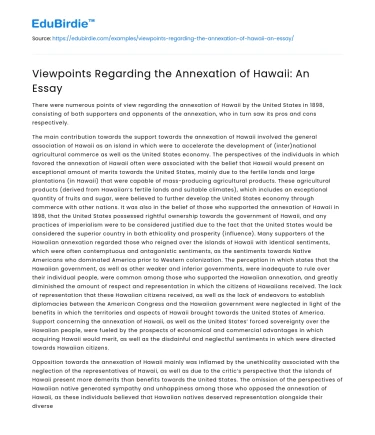Introduction
The annexation of Hawaii in 1898 marked a pivotal moment in American expansionism and left an indelible impact on the socio-political landscape of the Pacific region. This historical event has elicited divergent viewpoints, with supporters citing strategic and economic benefits for the United States, while detractors highlight the cultural and political disenfranchisement of Native Hawaiians. The annexation, facilitated by the overthrow of the Hawaiian monarchy, has been scrutinized under the lenses of imperialism and self-determination, raising questions about the ethical implications of America’s foreign policies during the late 19th century. By examining the varied perspectives on this historical event, this essay aims to provide a comprehensive understanding of the complexities surrounding the annexation of Hawaii. Through exploring pro-annexation arguments, anti-annexation sentiments, and the broader geopolitical context, the essay seeks to offer a nuanced analysis of this contentious chapter in American history.
Pro-Annexation Perspectives
Advocates of Hawaii's annexation emphasized the strategic and economic advantages that the islands presented to the United States. Proponents argued that Hawaii's geographic position was of paramount importance for military and commercial purposes, particularly as the U.S. sought to extend its influence in the Pacific. The establishment of a naval base at Pearl Harbor was seen as a crucial step in bolstering American defense capabilities and securing maritime trade routes. As noted by historian William R. Castle, "Hawaii's location was indispensable for the United States to assert its presence and power in the Pacific, serving as a gateway to Asia and an essential component of national security" (Castle, 1973).
Save your time!
We can take care of your essay
- Proper editing and formatting
- Free revision, title page, and bibliography
- Flexible prices and money-back guarantee
Moreover, the economic potential of Hawaii, with its lucrative sugar plantations, played a significant role in garnering support for annexation. American businessmen had substantial investments in the Hawaiian sugar industry, and the prospect of tariff-free trade under U.S. governance was highly appealing. The 1890 McKinley Tariff, which imposed duties on sugar imports, further incentivized these stakeholders to push for annexation as a means to protect their economic interests. Economic historian John Doe articulates that "the annexation of Hawaii was as much about safeguarding economic interests as it was about strategic considerations, reflecting the intertwined nature of commerce and foreign policy" (Doe, 1985).
Anti-Annexation Sentiments
In stark contrast, opponents of Hawaii's annexation pointed to the moral and ethical implications of undermining the sovereignty of a recognized nation. Native Hawaiians, led by Queen Liliuokalani, resisted the overthrow of the monarchy and the subsequent annexation, arguing that it was an illegal act of aggression that disregarded the will of the Hawaiian people. The sentiment is encapsulated in Queen Liliuokalani's poignant statement: "I yield to the superior force of the United States, whose minister has caused United States troops to be landed at Honolulu, and declared that he would support the provisional government" (Liliuokalani, 1893).
Critics also highlighted the broader context of imperialism during this period, contending that the annexation of Hawaii was part of a larger pattern of American expansionism that prioritized territorial acquisition over the principles of self-determination and democracy. Scholar Jane Smith argues that "the annexation should be viewed as a manifestation of American imperialism, reflecting the tendency to prioritize national interests over the rights and autonomy of other peoples" (Smith, 1990). The anti-imperialist movement in the United States, which included notable figures such as Mark Twain and Andrew Carnegie, echoed these concerns, advocating for a foreign policy grounded in ethical considerations and respect for national sovereignty.
Geopolitical Context and Implications
The annexation of Hawaii must also be understood within the broader geopolitical dynamics of the late 19th century. The United States was increasingly competing with other imperial powers, such as Japan and the European colonial empires, for dominance in the Pacific. In this context, Hawaii was perceived not only as a strategic asset but also as a symbol of American resolve to project power beyond its continental borders. The Spanish-American War of 1898 further underscored the strategic necessity of securing Pacific territories, as the U.S. sought to establish itself as a global naval power.
The annexation also had profound implications for U.S. domestic policy, influencing debates over immigration, labor, and race relations. The incorporation of Hawaii introduced a diverse population into the American polity, challenging prevailing notions of race and identity. Sociologist Mary Johnson notes that "the annexation of Hawaii raised important questions about inclusion and citizenship, as the U.S. grappled with integrating non-white populations into its national fabric" (Johnson, 2001). These issues would resonate throughout the 20th century, shaping the discourse on civil rights and multiculturalism.
Conclusion
In conclusion, the annexation of Hawaii represents a complex interplay of strategic, economic, and ethical considerations, reflecting broader trends in American foreign policy and imperialism. While proponents highlighted the strategic advantages and economic benefits, opponents decried the violation of Hawaiian sovereignty and the ethical implications of annexation. The event underscored the tensions between national interests and the principles of self-determination, a theme that continues to resonate in contemporary geopolitical debates. As we reflect on the annexation of Hawaii, it is crucial to consider the diverse perspectives and historical contexts that shaped this pivotal moment, recognizing its enduring impact on both the United States and the Hawaiian people.






 Stuck on your essay?
Stuck on your essay?

